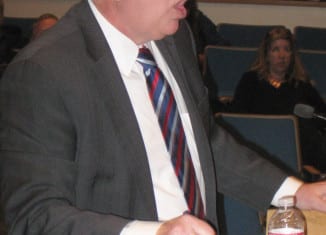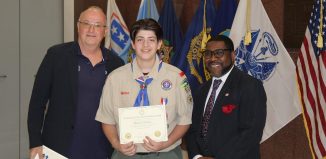A call for ethics tweaks in Huntington
Smorgasboard of suggestions at annual meeting
Huntington Town residents brought an assortment of suggestions to the annual public meeting of the town’s ethics board last week, where board members gathered input on improving the town’s ethics code.
The meeting room on Wednesday, March 18, was about half-full with attendees. Members of the town’s Board of Ethics & Financial Disclosure included Howard Glickstein, Louis England, Ralph Crafa and board counsel Steven Leventhal. Huntington Town Councilwoman Tracey Edwards (D) and Councilman Gene Cook (I) also attended the meeting.
Cook told board members that citizens have asked him “why the ethics board does not get back to them” when they make a complaint. He said he will send a letter to the board asking for an explanation, and he asked how long it would take the board to respond. Leventhal told Cook that “in all fairness,” ethics board members needed to see the letter before they could commit to a time frame for response. Cook pressed for details — “six months?” — and Leventhal said he “will undertake to help the board to respond to you in a reasonable amount of time.”
Many in the audience asked the board to hold public meetings quarterly, rather than once a year.
Robert Rockelein said he wanted to address “some noise in the streets” about the need for greater oversight of the ethics board. “Who’s watching the watchers?” he asked, and he called for increased scrutiny of the ethics board because “the current perception is that things are being swept under the table.”
Rather than relying on town employees to disclose their own finances, James Leonick said the ethics code should require employees submit supporting documents to back up their financial disclosure. He called for the information to be compared with documentation of previous years’ finances to show “any changes in assets, liabilities or income.” Leonick also said financial disclosure data should be kept on file for seven years. His request drew scattered applause and one listener murmured, “Excellent.”
Tom McNally said he spoke on behalf of the Huntington Republican Committee when he asked for mandatory training in ethics code for all town officials and employees. Such training “is done as standard operating procedure for most corporations,” he said.
He also said all ethics complaints filed with the town clerk should be made public, as well as all decisions of the ethics board, how they voted and whether any ethics board members recused themselves from a vote.
“Just looking for a little bit more transparency,” McNally said.
McNally asked the board to raise the penalty for ethics code violations, saying it should be much more than $5,000.
“We are now in the process of reviewing the code … we appreciate the thoroughness of your presentation,” Glickstein responded.
Marie Rendely took issue with Glickstein, calling him “good sir” and then pointing out that she used the term with sarcasm. “Our board of ethics is appointed by the town board,” she said. “Right there is a conflict of interest.”
Jim McGoldrick agreed, and said that when the ethics board is appointed by the town board, “it’s like the fox watching the chicken coop … it’s just not right.” Ethics board members should have no connection to the town, McGoldrick said.
Referring to recent Newsday reports of accusations of ethics violations by Councilman Mark Cuthbertson (D), Gerard Seitz said, “Why is Mark Cuthbertson still sitting on the town board? Why is he still voting on the downzoning of Oheka Castle for their luxury townhomes, when we already know about his questionable receiverships from [Oheka owner] Gary Melius along with Melius’ large Political donations?” Seitz said. “This isn’t an appearance of a conflict of interest, it is a conflict of interest.”







